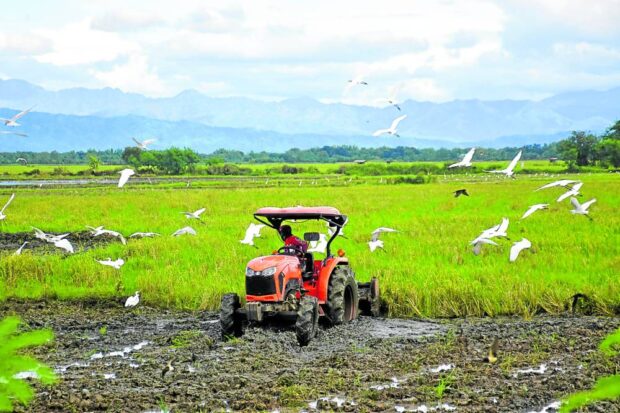Marcos cites mechanization to boost PH rice production

FARMING MADE EASY In this photo taken in January, a farmer in Urdaneta City, Pangasinan, uses a tractor to prepare his land for planting rice. Farmers in the province now use machines and
modern equipment provided by the government to increase the speed and efficiency of farm operations. —WILLIE LOMIBAO
KORONADAL CITY—President Marcos graced on Wednesday the launching of South Cotabato province’s rice production and modernization program but did not discuss in detail his campaign promise to bring down the price of the nation’s staple to P20 per kilo.
Spending less than an hour in nearby Banga town with farmers and agriculture officials, the President, the concurrent agriculture secretary, pushed for the mechanization of rice farming in line with his administration’s efforts to achieve food security.
The government, he said, has been working to lower the price of rice and increasing the volume of production through mechanization.
“Food security is our priority. We want to ensure there would be enough food for our countrymen,” Mr. Marcos said in Filipino.
Stressing that the Philippines is a rice-eating country, he said there was a need to make the price of rice cheaper, but stopped short of discussing how and when rice will be available to Filipino consumers at P20 per kilo, just as he promised last year.
“No one will buy rice at P60 a kilo so we need to bring the price down,” he said.
He said his administration “is continuously working to lower the price of rice and at the same time increase the income of Filipino farmers through better yield.”
Model
At the Kadiwa ng Pangulo trade fair in this city, where the President and his party proceeded, well-milled rice from the state-owned National Food Authority was sold at P25 a kilo. In different markets in the province, the cheapest premium rice sells for P40 a kilo.
Mr. Marcos visited South Cotabato to launch the Consolidated Rice Production and Mechanization Program (CRPMP) of the provincial government. He turned over a ceremonial check worth at least P115 million for the facility, which he hailed “as a model agricultural initiative of a local government unit in the country.”
The consolidation and mechanization of rice farming can reduce by half the production and labor costs incurred by farmers using traditional farming practices, which could increase their income aside from the proceeds of an improved yield, he said.
If the Philippines will have to compete with Thailand and Vietnam in rice production, Mr. Marcos stressed that mechanization “is the answer.”
For the Philippines, mechanization will work for the rice sector if small farmers adopt the concept of consolidating their farms, he added.
South Cotabato Gov. Reynaldo Tamayo Jr. said they conceptualized the CRPMP to increase rice production, enhance food production in the area and improve farmers’ income while making rice affordable to consumers.
“So far, 100 hectares (ha) of palay farms have already been consolidated,” Tamayo said, adding that the provincial government was targeting to consolidate at least 1,400 ha in different parts of the province under CRPMP.
He said the facility would serve as a “one-stop shop” for pre and postharvest needs of rice farmers and government agencies.
The agricultural facility in Barangay Liwanay will house an integrated rice processing center, warehouse, motor pool and administration building, including payment center for farmers, among others, said Tamayo, also president of Partido Federal ng Pilipinas, the political party that carried Mr. Marcos’ candidacy during last year’s elections.